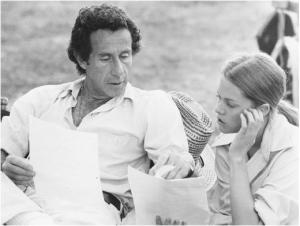 Arthur Hiller Penn (born September 27, 1922, Philadelphia, Pennsylvania) is a film director and producer. Although best known as the director of the iconic Bonnie and Clyde (1967) Arthur Penn amassed a critically acclaimed body of work though the 1960s and 1970s, keenly focusing on leftist themes relevant to the times.
Arthur Hiller Penn (born September 27, 1922, Philadelphia, Pennsylvania) is a film director and producer. Although best known as the director of the iconic Bonnie and Clyde (1967) Arthur Penn amassed a critically acclaimed body of work though the 1960s and 1970s, keenly focusing on leftist themes relevant to the times.
After making a name for himself as a director of quality television dramas, Penn made his feature debut with a Western, The Left Handed Gun (1958). A re-telling of the Billy the Kid legend, it was notable for its sharp portrayal of the outlaw (played by Paul Newman) as a psychologically troubled youth (the role was originally intended for the archetypal troubled teen James Dean).
Penn’s next film was The Miracle Worker (1962), the moving story of Anne Sullivan‘s struggle to teach the blind and deaf Helen Keller how to communicate. It garnered two Academy Awards.
In 1965 Penn directed the bizarre, surreal Mickey One. Heavily influenced by the French New Wave, it was the dream-like story of a stand-up comedian (played by Warren Beatty) on the run from sinister ambiguous forces. Ambitious, startlingly shot and elliptically edited, it baffled critics and audiences alike. Even forty years on the film has failed to achieve the cult status that some would argue it deserves. It may be worth noting that Mickey One’s atmosphere of sweaty paranoia foreshadows some of the conspiracy thrillers of the 70’s- not least Warren Beatty’s later Parallax View. (Penn himself later contributed to the genre with Night Moves)
Penn’s next film was The Chase (1966) a taut thriller following events in a small corrupt Southern town on the day an escaped convict returns (played by Robert Redford). Although not a major success, The Chase nonetheless caught the mood of the turbulent times, a ‘state of the nation’ tale of racism, corruption and the violence endemic in American society. The film is also notable for an extended brutally violent scene where Marlon Brando’s sheriff is beaten to a bloody pulp- the latest in a long line of masochistic beatings the actor received on-screen in his career (see also One-Eyed Jacks and On the Waterfront).
Re-uniting with Warren Beatty for the rural gangster film Bonnie and Clyde (1967), Penn once again showed that he had his finger on the pulse of the zeitgeist, perfectly catching the youthful disenchantment of the late ’60s. Although depression-set, it was very much in the spirit of the counter-culture. Bonnie and Clyde went on to become a worldwide phenomenon, at the same time (along with Peckinpah’s The Wild Bunch a year later) pushing the limits of acceptable screen violence with its bloody machine-gun climax.
Once again the film drew strong influence from the French New Wave and itself went on to make a huge impression on a younger generation of film-makers. Indeed there was a strong resurgence in the “love on the run” sub-genre in the wake of Bonnie and Clyde, most notably Badlands (1973) (where Penn received acknowledgement in the credits).
Next came Alice’s Restaurant (1969), based on one of Arlo Guthrie’s songs, a satirical account 1960’s counter culture. His next film after this was a return to the western, Little Big Man (1970), a shaggy dog account of one man’s life (played by Dustin Hoffman), a white man adopted into Native (Cheyenne) society. In scale it was Penn’s most expansive film to date, an epic blackly comic tale and clearly revisionist in its tone (Little Big Man was one of the many revisionist Westerns released in the late 60’s, early 70’s).
In 1973 Penn provided a segment for the Olympic film Visions of Eight along with several other major directors such as John Schlesinger and Miloš Forman. The director’s next two films showed he had lost none of his ambition (not least in his eclecticism). First came a paranoid L.A.-set thriller, Night Moves (1975) about a private detective (played by Gene Hackman) on the trail of a runaway.
Next came another comic western which reunited him with Marlon Brando, The Missouri Breaks (1976), a ramshackle, eccentric story of a horse thief (Jack Nicholson) facing off with an eccentric Irish bounty hunter (Brando). Although receiving mixed reviews at the time, it is held in considerable esteem by many critics now.
Four Friends (1981) was a traumatic look back at the 60’s, returning to the old themes of Vietnam, civil rights, sexual politics, and drugs. Penn’s career subsequently lost its momentum: Target (1985) was a mainstream thriller reuniting the director with Gene Hackman. Dead of Winter (1987) was a horror/thriller in the vein of Alfred Hitchcock.
Since this Penn has returned to work in television, including an executive producer role for popular crime series Law & Order.
Work
Filmography
- Penn & Teller Get Killed (1989)
- Dead of Winter (1987)
- Target (1985)
- Four Friends (1981)
- The Missouri Breaks (1976)
- Night Moves (1975)
- Little Big Man (1970)
- Alice’s Restaurant (1969)
- Bonnie and Clyde (1967)
- The Chase (1966)
- Mickey One (1965)
- The Miracle Worker (1962)
- The Left Handed Gun (1958)
Stage
- Two for the Seesaw (1958)
- The Miracle Worker (1959)
- Toys in the Attic (1960)
- An Evening With Mike Nichols and Elaine May (1960)
- All the Way Home (1960)
- Golden Boy (1964)
- Wait Until Dark (1966)
- Sly Fox (1976)
- Fortune’s Fool (2002)

Pingback: À tout de suite (Right Now) An Interview With Director « Eurocinema’s Weblog